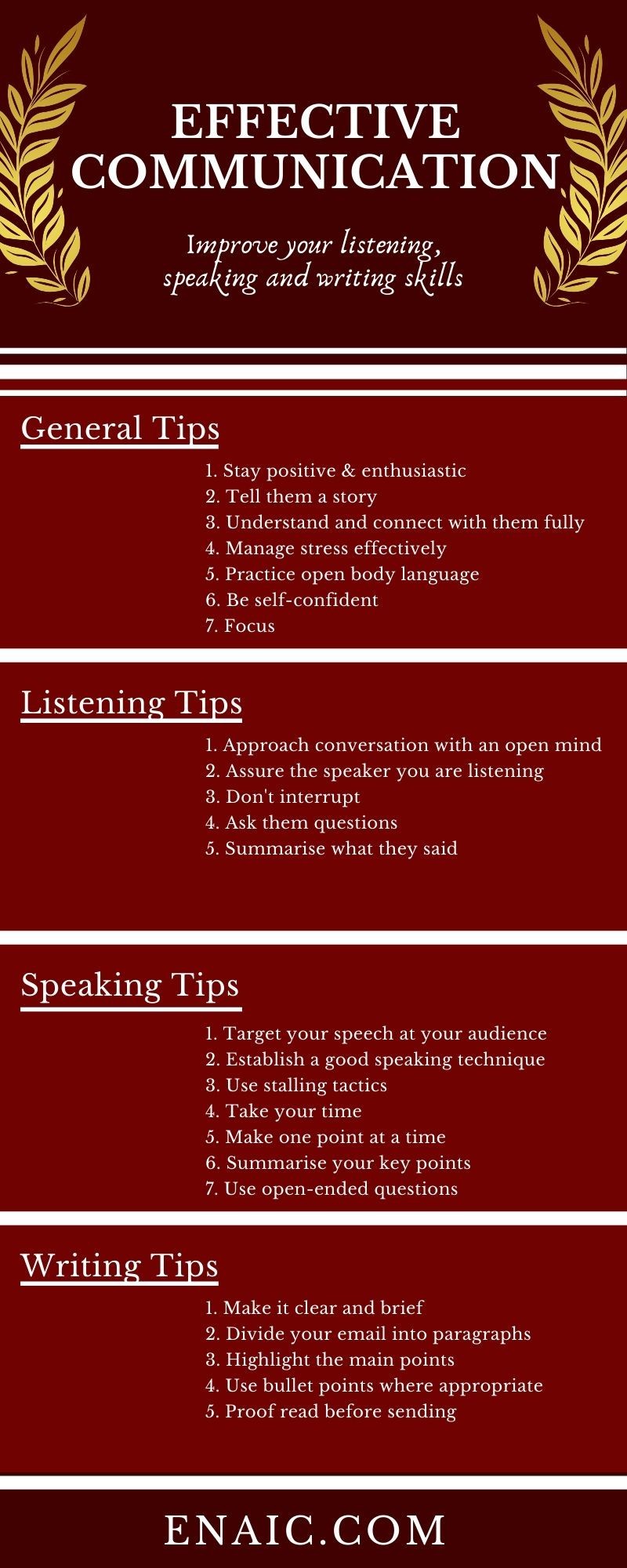How about I give you the key to transforming your life into an easy and fun-filled adventure? In this article, I will unveil to you the secrets to effective communication which can do this for you. Interacting with people in a manner that they understand you and you understand them is one of the greatest, if not the greatest, hurdle in a human life. All arguments could be avoided if the mutual understanding was achieved in time. Remember, communication is often not what you say but how you say it that makes all the difference.
General Communication tips
Stay positive and enthusiastic
Positive people are more likeable and get more attention from others. It is not only about being a more positive person, but also about being more enthusiastic during the conversation itself. You will have a hard time convincing someone to agree with you on a topic you are not passionate about. It is your enthusiasm for basketball that convinces your friends to play with you. Remember to present your thoughts in a positive light if you want people to agree or follow you.
Tell them a story
Allegories are great when explaining a difficult concept to someone. It is a brief story that can picture the situation better or to which the person can relate. Great philosophers often used allegories to explain their ideas to others. Just like Plato explaining human perception by an image of people chained to a wall in a cave.
So from now on, if you need to explain a difficult idea to someone, tell them a story filled with allegories to understand you better. Instead of finding words to describe your pain after a break-up, tell them a story of how it happened and compare your feelings allegorically to a physical pain they experienced in the past.
The same applies to explaining your point in a workplace. If you are giving a proposal, make sure to break down the concepts in a structured manner with introduction, main explanation filled with examples and your conclusions. Use examples that your audience can relate to, for instance, compare that difficult project you are about to start with climbing a mountain.
Make sure to reiterate the most important points at the end of your presentation in a form of a take-home message. Finally, make sure to value the time of your audience and remember that people have a short attention span so you need to make your point clear without losing them in the process.
Understand and connect with them fully
People perceive the world in various ways. It is difficult to convey your message without understanding of the person you are speaking to. Things such as age (teenagers’ recklessness vs wise elderly people) , cultural (e.g. US easy going v Japanese reserved behaviour), social (upper class, middle class), religious (Christians, Muslims, Hindus etc) and economic (the rich vs the poor) differences can inhibit effective communication.
Even differences in upbringing or emotional maturity can create difficulties. The more you can understand and connect with a person, the more effective the communication will be between the two of you.
Manage stress effectively
Social interactions can get stressful, especially if you are speaking to your management at work or with your new date in a romantic setting. Managing stress isn’t easy, but there are things you can do to manage them better. A combination of a tested approach to stress management and a controlled exposure to stressors allows you to overcome the negative effects of stress. Check out this article on stress management to find out more details.
Practice open body language
Non-verbal cues are as important or sometimes even more important than the verbal communication. Things such as the way you look and dress; your movements and the tone of your voice when you speak; your attitude and gestures when you listen; all make a tremendous impact on the people involved in the conversation. You should try your best to avoid negative body language (closed body posture, crossed legs and arms).
Make sure that your non-verbal signs are in alignment or better yet, support what you are saying. Whenever you are on the listening side of a conversation, observe the speaker’s body language to understand their point better and to learn additional things which would be unnoticeable otherwise. For example, you may be able to pick up if the speaker isn’t telling the truth (if they are avoiding an eye contact) or how convinced they are of what they say (if their tone of voice becomes more quiet).
Be self-confident
Speaking with confidence during any conversation makes you come across as more reliable. Your self-confidence has a direct impact on how many people believe in what you say. If you don’t believe in your own words, others will doubt them too. The best way to boost your confidence level is to dwell more into any subject you want to talk about.
Learning technical details of your profession (e.g. revising all technical calculations in an engineering role) can help you become more confident at work. Whereas, a general knowledge (e.g. current state of affairs topic can serve as an ice-breaker) can help in all other social interactions such as spending time with friends and dating.
Focus
Good communication requires attention on both parts. You should focus on making your point in such a way that the other person can easily understand you. You don’t want to be just saying random things for the sake of it. If you are the one listening to someone, pay full attention to them. Try not to let your mind wonder off somewhere, as this will make you miss the point.
Listening tips
Approach conversation with an open mind
Be curious about the topic under discussion. Assume a positive attitude towards the speaker and the subject matter, as if you wanted to learn something new and exciting. Your open-mindedness will be appreciated and result in the understanding of the essential points much easier.
Assure the speaker you are listening
There is nothing more frustrating when you are talking to someone and they are not listening. Show your interest via nonverbal signals such as maintaining the eye contact, nodding and smiling at the right time during the conversation. Such behaviour would reassure the speaker and make the conversation much more pleasurable.
Don’t interrupt
Let the speaker finish not only a sentence but their full train of thought. This is not only a good practice and shows your respect to the speaker but also it will probably help you understand their point better than if you kept interrupting them.
Ask them questions
As much as you don’t want to disturb them while speaking, you do want to ask them questions when they finish explaining their point. This shows you have listened to what they said and that you are indeed interested to know more about the subject. Asking questions also helps in case where the speaker didn’t make themselves clear. Follow-up questions will prompt the speaker to articulate their point better.
Summarise what they said
It’s useful to summarise the key points made by the speaker in your own words at the end of the conversation. This is good because it will re-assure you that you have understood the points correctly. This is especially important at work when you will be asked to do something following a conversation. You want to make sure you are doing the right thing.
Speaking tips
Target your speech at your audience
The way you present a topic should be adjusted to the audience. You will use different language if you are talking to a child as opposed to speaking with an adult. You may use a lot of jargon in your workplace. However, if you speak with clients, you will choose simple words to explain yourself so they can follow and understand you. You will have to use judgement when speaking to a large and mixed audience to make sure your speech targets the majority.
Establish a good speaking technique
Establish a correct speaking technique. Speak loud and clear, maintain a sound tone of voice and remember to maintain an eye contact throughout your speech. Make sure your body language is welcoming, with your arms either rested, or extended in an open gesture. You may want to use accent to highlight important points.
Use stalling tactics
Stalling tactics are great when someone asks you a question you really didn’t expect. It gives you time to think without sounding unprofessional. One of ways to do this is by asking for clarification. You can also repeat the question to make sure you understood it correctly or build up a full-sentence answer which can also give you time to think.
You may want to use a phrase such as “This is a very good question…” or “I have never thought about that before, but…”. If everything fails, you can simply ask for more time to think about it or get back to them at a later stage. Stalling tactics are much better than trying to answer and mutter the first few sentences.
Take your time
Never rush when it’s your time to talk. No matter whether you are giving a presentation or simply answering a question, make sure to speak slowly and soundly. This makes you seem more professional and helps the audience to understand you better. It also gives you time to form next sentences you are going to say. You may find it useful to pause and collect your thoughts in meaningful moments. This has an added benefit of profoundly highlighting your points.
Make one point at a time
Avoid monologues as much as possible. There is no better way to lose people’s attention than by talking monotonously for hours on end. An average attention span of a person is around 10 minutes, so seriously try to limit your speech to that time. If you say multiple things in one go without giving your audience time to digest, they will have difficulties grasping your points. In fact, you may be very unlucky and they miss most of what you have said. Break up your speech into well-organized sizeable chunks that follow coherently from the start to finish.
Summarise your key points
This is particularly important during lengthy speeches and presentations. The focal point of a conversation can slip away, if there is a lot that has been said. It helps if you can summarize your key point (keep it to 2-3 maximum) at the end of the meeting. This way you ensure that people will leave with the main message in their minds.
Use open-ended questions
Open-ended questions are a great way to prompt your audience to think by themselves. They may or may not share the results of this brain exercise with you. Depending on your goal, you can prompt them to answer or leave their answer to themselves.(e.g. How would you like to proceed with this proposal? What do you think the consumers would appreciate?)
Writing tips for emails
Make it clear and brief
Write short sentences to make it easy to understand in a minimum amount of time. People are too busy to read long detailed emails, especially your management. Quick emails which get your point across will be much more appreciated by them and are easy for you to write. People will follow up if they are interested in the details.
Divide your email into paragraphs
Your email will be much more reader friendly if it is divided into paragraphs. You can take this a step further and present each point you make in a separate paragraph. Emails structured in this way are easier for the eyes to fish out the necessary information and therefore much more desirable.
Highlight the main points
Highlighting some text by using bold font or underline is another great way to flag out what should be noticed. Use this technique for names, dates, times and places which are of great importance. Make sure not to abuse this though as it will lose its charm.
Use bullet points where appropriate
Bullet points are not appropriate in all types of emails, but for some of them, they can be a great way to structure and convey your thoughts. Similar to the use for paragraphs, you should use each bullet point for a separate matter you are discussing and thus making your message clearer.
Proof read before sending
I always proof read my emails just before sending them off. I do this because I would feel embarrassed if someone got an email from me with mistakes in it. However, proof reading is something people do less and less. Mistakes and typos are much more widely accepted and not picked on. I would still encourage you to at least skim-through your email before sending it to your management. It just looks that much more professional.
You have been given the key to successfully communicate with all the people in your life. Make your interactions clear and always to the point. Your focus should always be on the person you are speaking to and on taking all the effort in making them understand you, otherwise there is no point in you speaking at all. The more personal you make it to your audience, the better response you are going to get.




